

Fiche d'identité HDA 4ème Le spiritual. Lesson HiddenMessages. 1èL2 - Your protest song test. - English in Gambier. FROM WORK SONGS TO PROTEST SONGS - Le blog de Chad. O’Brother Where Art Thou ?
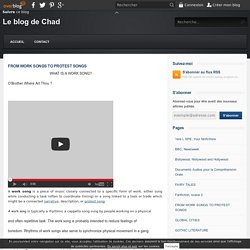
A work song is a piece of music closely connected to a specific form of work, either sung while conducting a task (often to coordinate timing) or a song linked to a task or trade which might be a connected narrative, description, or protest song. A work song is typically a rhythmic a cappella song sung by people working on a physical and often repetitive task.
The work song is probably intended to reduce feelings of boredom. Frequently, the usage of verses in work songs are often improvised and sung differently each time. Expression: improvised verses sung by slaves had verses about escaping, improvised verses sung by sailors had verses complaining about the captain and the work conditions. Songs also help to create a feeling of familiarity and connection between the workers. VOA:link script:link Protest songs timeline task. You will have to create a protest songs timeline for your task. Have to do. Choose your partners (3 or 4 per group) Task 1 : it. To aim at V-ing. (1ERE LVA) THE PROTEST SONG PROJECT - MISS ANGEL'S WORLD : ENGLISH IN CAMUS. Click on the logo!
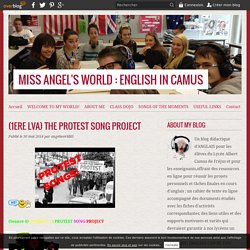
Yoday you finished working on your Protest Song Analysis. 3) Choose your favourite protest song and present it to the class. Present the singer, its historical or political context, the lyrics ; Sum up its issue (s) (problem ,subject) , the message etc. To help you in this TASK , you will have to follow the instructions on the Protest Song Analysis Worksheet provided . Click on this to reach the page . Need a dictionary . Need help to translate . Need help with synonyms. Protest songs sequence. The power of music. Documents - Courts extraits de chansons "à texte", "engagées" (des années 1960 à nos jours, appartenant à des genres musicaux différents et luttant pour des causes variées), - Documents audio/vidéo: - La chanson des Sex Pistols "God Save the Queen" - Henry Rollins répondant à la question "What is punk?
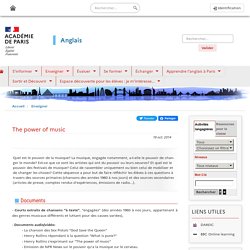
" - Henry Rollins s'exprimant sur "The power of music" - Emission de NPR News sur le pouvoir qu'a la musique sur le cerveau. - Documents textes: - Les paroles des chansons abordées dans la séquence, - Deux articles de presse sur le festival des 1985 Live Aid (l'un de MTV.com, l'autre du Daily Mail), - Un article de presse du New York Times sur le lien étroit entre musique et combat pour les droits civiques des Afro-Américains Lien avec le programme Lieux et formes de pouvoir Niveaux Piste(s) d'exploitation envisagée(s) Voici des suggestions de mise en oeuvre, pistes d'exploitation et idées de tâches finales. Anticipation Suggestions d'activités et de tâches Tâche finale envisageable Evaluations.
The sounds of music: deux séquences articulées autour du thème de la musique. - [English website of the Académie de Toulouse] J’ai travaillé sur le thème de la musique (en partant de certains documents du manuel NEW STEP IN 3ème que nous utilisons au collège).
![The sounds of music: deux séquences articulées autour du thème de la musique. - [English website of the Académie de Toulouse]](http://cdn.pearltrees.com/s/pic/th/sequences-articulees-academie-75810841)
The power of music. The sounds of music: deux séquences articulées autour du thème de la musique. - [English website of the Académie de Toulouse] PROTEST SONGS. A protest song "is a song which is associated with a movement for social change and hence part of the broader category of topical songs (or songs connected to current events).
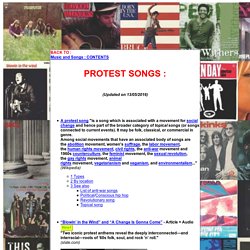
It may be folk, classical, or commercial in genre. Among social movements that have an associated body of songs are the abolition movement, women's suffrage, the labor movement, the human rights movement, civil rights, the anti-war movement and 1960s counterculture, the feminist movement, the sexual revolution, the gay rights movement, animal rights movement, vegetarianism and veganism, and environmentalism... " Collège Pablo Neruda EVREUX - Protest Songs. Not talkin' bout a revolution: where are all the protest songs? Last November, the folk singers Nancy Kerr, Martyn Joseph, Sam Carter and Maz O’Connor went to Westminster to perform for MPs.
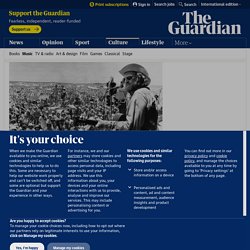
Nothing so remarkable about that, perhaps, but what they were singing about might have made several of their audience a little uncomfortable. The musicians were there to launch Sweet Liberties, a project marking 800 years of British democracy as seen through episodes from the Levellers and Tolpuddle Martyrs to the modern-day Race Relations and Human Rights Acts. In a year that marked the 800th anniversary of the sealing of Magna Carta and 750 years since the Simon de Montfort parliament, the four celebrated the pursuit of democracy and sung songs new and old, written about the rights and liberties that people have fought to achieve and protect over the centuries. “The topics in our songs all deserve to be celebrated – but we’d also like to highlight some uncomfortable truths which matter to vulnerable people today,” says Kerr.
But things might be changing.